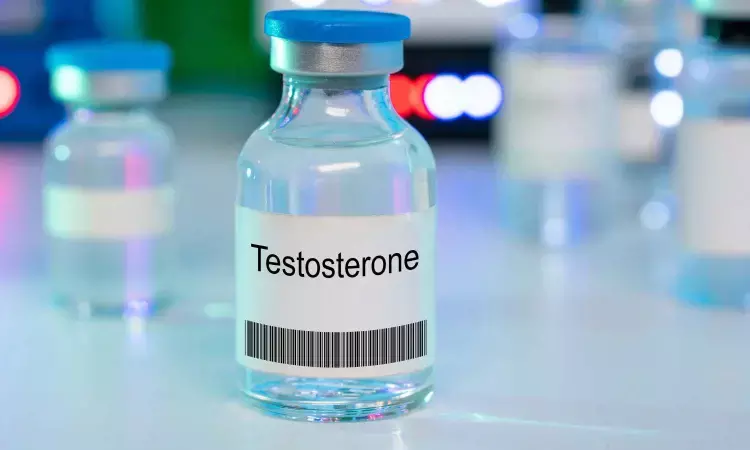- Home
- Medical news & Guidelines
- Anesthesiology
- Cardiology and CTVS
- Critical Care
- Dentistry
- Dermatology
- Diabetes and Endocrinology
- ENT
- Gastroenterology
- Medicine
- Nephrology
- Neurology
- Obstretics-Gynaecology
- Oncology
- Ophthalmology
- Orthopaedics
- Pediatrics-Neonatology
- Psychiatry
- Pulmonology
- Radiology
- Surgery
- Urology
- Laboratory Medicine
- Diet
- Nursing
- Paramedical
- Physiotherapy
- Health news
- Fact Check
- Bone Health Fact Check
- Brain Health Fact Check
- Cancer Related Fact Check
- Child Care Fact Check
- Dental and oral health fact check
- Diabetes and metabolic health fact check
- Diet and Nutrition Fact Check
- Eye and ENT Care Fact Check
- Fitness fact check
- Gut health fact check
- Heart health fact check
- Kidney health fact check
- Medical education fact check
- Men's health fact check
- Respiratory fact check
- Skin and hair care fact check
- Vaccine and Immunization fact check
- Women's health fact check
- AYUSH
- State News
- Andaman and Nicobar Islands
- Andhra Pradesh
- Arunachal Pradesh
- Assam
- Bihar
- Chandigarh
- Chattisgarh
- Dadra and Nagar Haveli
- Daman and Diu
- Delhi
- Goa
- Gujarat
- Haryana
- Himachal Pradesh
- Jammu & Kashmir
- Jharkhand
- Karnataka
- Kerala
- Ladakh
- Lakshadweep
- Madhya Pradesh
- Maharashtra
- Manipur
- Meghalaya
- Mizoram
- Nagaland
- Odisha
- Puducherry
- Punjab
- Rajasthan
- Sikkim
- Tamil Nadu
- Telangana
- Tripura
- Uttar Pradesh
- Uttrakhand
- West Bengal
- Medical Education
- Industry
Testosterone replacement fails to prevent progression of prediabetes to diabetes in men with hypogonadism: JAMA

USA: Testosterone replacement therapy (TRT) alone should not be used as a therapeutic intervention to prevent or treat diabetes in men with hypogonadism, a recent study published in JAMA Internal Medicine has suggested.
The study did not provide evidence of the efficacy of testosterone replacement therapy in preventing the progression from prediabetes to diabetes or improving glycemic control in men with hypogonadism.
In the randomized clinical trial (RCT) of 5204 participants (45 to 80 years) with hypogonadism and prediabetes (n = 1175) or diabetes (n = 3880), there was no significant difference in the risk of progression from prediabetes to diabetes between a group that received TRT and a placebo group, and TRT did not improve blood sugar control on men with prediabetes or diabetes.
Prediabetes is associated with an elevated risk of progression to type 2 diabetes, chronic kidney disease, cardiovascular disease, and all-cause mortality. In men, low testosterone levels are associated with an increased risk of prediabetes and type 2 diabetes.
Testosterone replacement therapy in men with hypogonadism reduces whole body and visceral fat mass, improves insulin sensitivity, and increases muscle mass. Testosterone-induced increases in muscle mass may secondarily improve metabolic outcomes. However, the effect of TRT in men with hypogonadism on the risk of progression from prediabetes to diabetes or of inducing glycemic remission in those with diabetes is unknown.
To fill this knowledge gap, Shalender Bhasin, Harvard Medical School, Boston, Massachusetts, and colleagues aimed to evaluate TRT's efficacy in preventing progression from prediabetes to diabetes in men with hypogonadism who had prediabetes and in inducing glycemic remission in those with diabetes.
For this purpose, the researchers conducted a nested substudy, an intention-to-treat analysis, within a placebo-controlled randomized clinical trial (TRAVERSE) at 316 trial sites in the US. It included men aged 45 to 80 years with hypogonadism and prediabetes or diabetes who were enrolled in TRAVERSE.
Participants were randomized in the ratio of 1:1 to 1.62% testosterone gel or placebo gel until study completion. Of 5204 randomized participants, 1175 with prediabetes (mean age, 63.8 years) and 3880 with diabetes (mean age, 63.2 years) were included in the study. The mean haemoglobin A1c level in men with prediabetes was 5.8%.
The study's primary endpoint was the risk of progression from prediabetes to T2D, analyzed using repeated-measures log-binomial regression. The secondary endpoint was the risk of glycemic remission in men who had diabetes.
Glycemic remission was calculated as haemoglobin A1c level <6.5% [to convert to the proportion of total haemoglobin, multiplied by 0.01] or 2 fasting glucose measurements <126 mg/dL [to convert to mmol/L, multiplied by 0.0555] without diabetes medication.
The following were the key findings of the study:
- The risk of progression to diabetes did not differ significantly between testosterone and placebo groups: 0.7% versus 1.4% at six months, 7.8% versus 10.7% at 12 months, 10.1% versus 14.6% at 24 months, 12.8% versus 15.8% at 36 months, and 13.4% versus 15.7% at 48 months.
- The proportions of participants with diabetes who experienced glycemic remission and the changes in glucose and haemoglobin A1c levels were similar in testosterone- and placebo-treated men with prediabetes or diabetes.
"The incidence of progression from prediabetes to diabetes did not differ significantly between testosterone- and placebo-treated men in middle-aged and older men with hypogonadism and prediabetes in the TRAVERSE Diabetes Study," the researchers wrote.
"Testosterone replacement therapy failed to improve glycemic control in men with hypogonadism and prediabetes or diabetes."
Reference:
Bhasin S, Lincoff AM, Nissen SE, et al. Effect of Testosterone on Progression From Prediabetes to Diabetes in Men With Hypogonadism: A Substudy of the TRAVERSE Randomized Clinical Trial. JAMA Intern Med. Published online February 05, 2024. doi:10.1001/jamainternmed.2023.7862
Dr Kamal Kant Kohli-MBBS, DTCD- a chest specialist with more than 30 years of practice and a flair for writing clinical articles, Dr Kamal Kant Kohli joined Medical Dialogues as a Chief Editor of Medical News. Besides writing articles, as an editor, he proofreads and verifies all the medical content published on Medical Dialogues including those coming from journals, studies,medical conferences,guidelines etc. Email: drkohli@medicaldialogues.in. Contact no. 011-43720751


